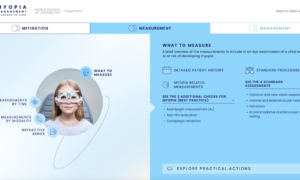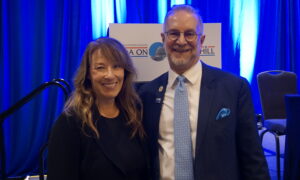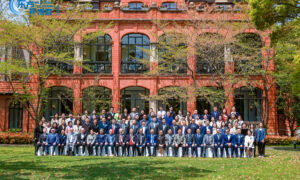March 15, 2024
By Silvia Ruojin Ren, OD, MD, PhD
Commitment to continuous learning is crucial given the dynamic nature of myopia research and treatment strategies. It ensures that my clinical practices remain at the forefront of the field, thereby maximizing patient outcomes.
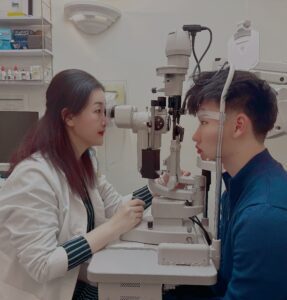
Dr. Ren’s experience treating her son, David, helps her connect with her myopia management patients.
The pursuit of myopia management has long been a personal and professional aspiration. Prior to establishing my practice in the United States, I dedicated 12 years of service as an ophthalmologist at the esteemed Eye Center at Beijing Tongren Hospital. My journey in the field led me to the United States, where I pursued a postdoctoral fellowship before enrolling in the SUNY College of Optometry.
I undertook the establishment of my own practice, Visionland Eye Care, located in White Plains, New York, approximately two years ago. Throughout this transitional period, my unwavering commitment has consistently gravitated towards the realm of pediatric eye care, with a specialized focus on the meticulous management of myopia.
How My Experience Influences My Care
My husband and I, both myopic, harbored concerns about our children inheriting this condition. Our apprehensions deepened when our son received a myopia diagnosis at the age of 10. As an eye care professional, I applied my knowledge to address his case, but despite two attempts with different concentrations of low-dose atropine, his myopia progressed rapidly. Transitioning him to orthokeratology lenses several years ago proved transformative. At 18, his prescription has remained stable for five years, and his axial length falls within the normal range. I often share his case with patients and their parents, leveraging my dual perspective as both a parent and a practitioner. This allows me to connect empathetically, instilling trust in providing a comparable level of care for their children.
A Consultation is Key
Individualized care is pivotal in our approach to myopia management, where each patient is assessed on a case-by-case basis. Our dedicated myopia consultations, distinct from routine eye exams, extend for approximately one hour, involving both parents whenever feasible. This comprehensive session delves into the child’s eye health, offering a detailed understanding and outlining potential interventions.
Recognizing the importance of establishing a solid foundation for myopia management comprehension, we prioritize this dedicated time, especially given our typical annual interaction with pediatric patients. We aim for all stakeholders to be well-informed and aligned in their understanding.
Treatment decisions hinge on the child’s age, maturity, and lifestyle. Through thorough examinations during consultations, we tailor our recommendations to each patient’s unique characteristics. Our office provides three myopia management options: OrthoK, soft multifocal contact lenses, and low-dose atropine. The choice is informed by carefully considering the individual’s needs and lifestyle.
While we offer all three options, OrthoK is often preferred, allowing for greater customization of lenses. Parents appreciate the control and supervision involved in the at-home application, especially for active children. The preference for a glasses- and contacts-free daytime experience, particularly among active and athletic kids, further underscores the convenience of OrthoK in aligning with their lifestyles.
Spreading the Word About Myopia Management
Patient or parental education is an essential aspect of health care, particularly in the realm of myopia management. Our approach to patient education extends beyond those directly affected by myopia. In a manner akin to our approach to comprehensive family eye care, we conduct thorough ocular examinations, inclusive of measuring axial length, establishing baseline ocular metrics, and performing cycloplegic refraction. These assessments enable us to ascertain whether a child is at an increased risk of myopia progression, information that is crucial for parents to understand.
To enhance understanding, I have developed educational materials that are disseminated to patients and their guardians. These materials succinctly introduce the concept of myopia, elucidate the potential complications arising from its progression and the state of high myopia, and outline the treatment modalities available at our clinic. This proactive educational strategy is particularly pertinent in a community characterized by a high level of education, where a significant proportion of guardians are already acquainted with the principles of myopia management, often through personal experience. This familiarity typically results in a willingness to initiate treatment for their children without hesitation. The feedback from parents has overwhelmingly highlighted an appreciation for the proactive nature of our myopia management discussions, with concerns regarding cost or relevance being notably absent.
The principal challenge encountered in the realm of myopia management is not limited to individual cases but extends to community-wide educational efforts. The post-COVID-19 era has witnessed a marked increase in the incidence of juvenile-onset myopia, accompanied by a heightened risk of progression to high myopia. Despite these trends, there remains a notable portion of eye care practitioners who persist in the exclusive prescription of single-vision lenses for children, often without scheduling follow-up assessments in a timely manner. It is disheartening to encounter instances where children have experienced significant myopia progression to -6.00D or -7.00D by the time they are presented for consultation. This underscores the imperative need for our industry to intensify efforts in communicating the risks associated with unmanaged myopia, the critical role of regular ocular examinations, and the advantages of engaging in early myopia treatment strategies.
Knowledge is Power
Maintaining an up-to-date understanding of the latest developments in myopia management is of paramount importance to my practice as a health care professional specializing in this field. Engaging with scholarly publications, such as Review of Myopia Management, represents a highly efficient, informative, and valuable approach to keeping abreast of new research findings and clinical advancements. I diligently peruse each edition, synthesizing knowledge from a diverse array of experts in the realm of myopia management. This rigorous approach equips me with the necessary insights to enhance the quality of patient care significantly.
Furthermore, I actively participate in professional gatherings, both virtually and in-person, monthly. This commitment to continuous learning is crucial given the dynamic nature of myopia research and treatment strategies. It ensures that my clinical practices remain at the forefront of the field, thereby maximizing patient outcomes.
The dissemination of cutting-edge research findings and innovative treatment methodologies to my patients is a testament to my dedication to excellence in myopia management. Patients consistently express appreciation for my efforts to integrate the latest scientific evidence into their care, recognizing it as indicative of a steadfast commitment to delivering care of the highest caliber.
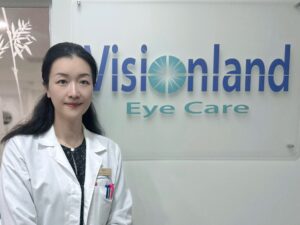 |
Dr. Ruojin Silvia Ren owns and practices at Visionland Eye Care in White Plains, NY. To contact her: info@visionlandeyecare.com |




